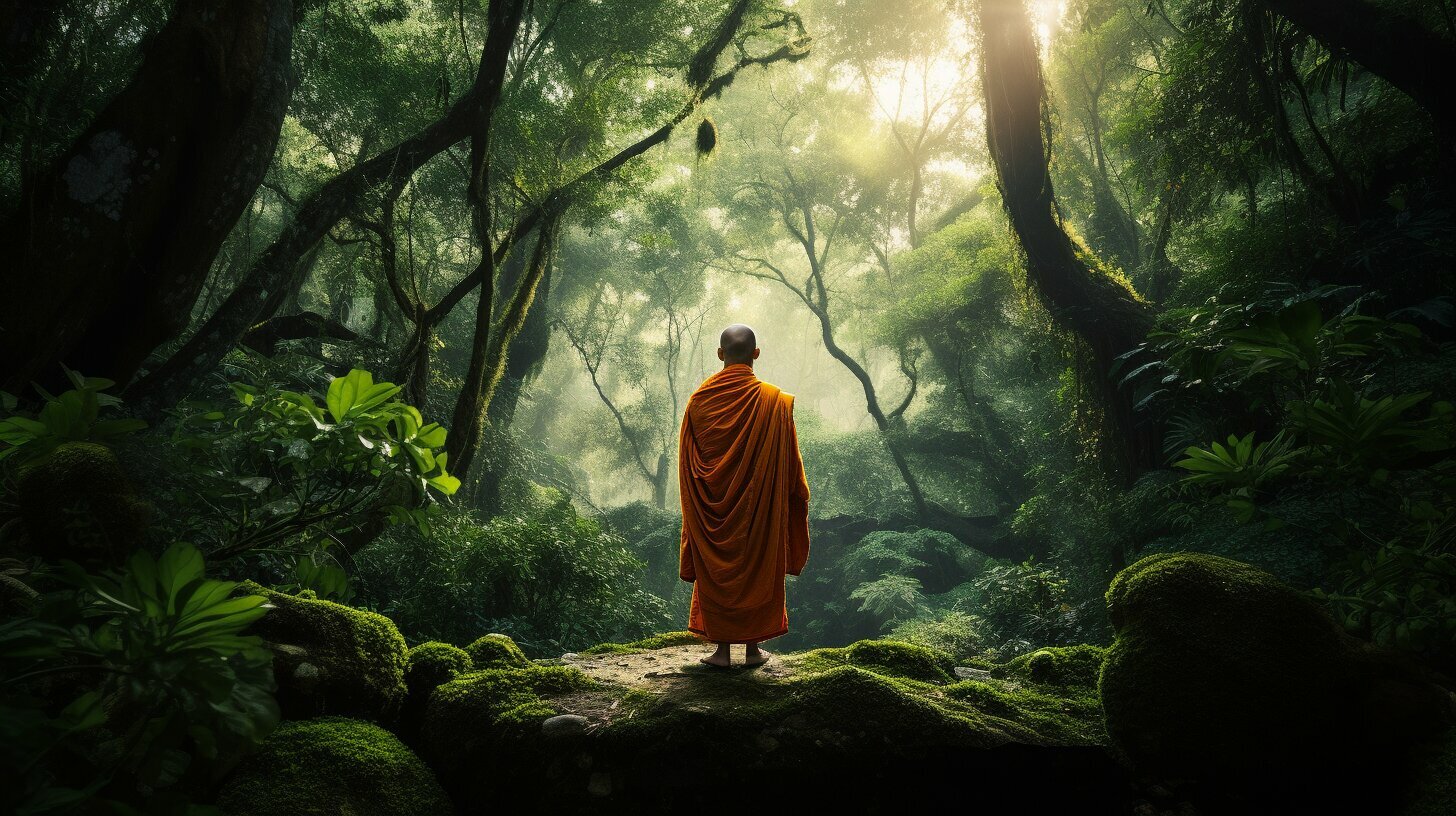Unveiling the Mystery: Why Do Buddhist Monks Wear Orange?
Have you ever wondered why Buddhist monks don vibrant orange robes? In this article, we will delve into the fascinating reasons behind their distinctive attire and explore the symbolism, history, and cultural meaning associated with it.
Factual data: Buddhist monks wear orange robes for several reasons. One reason is that orange was chosen as the dye available at the time and has become the color of choice for Theravada Buddhist followers in Southeast Asia. The robes symbolize simplicity and detachment from materialism. The monks’ hair is shaved to further symbolize simplicity and detachment. Another reason for the orange color is that it represents the soil and the monks’ connection to the Earth. The robes create uniformity and strip away personal attributes and identifications. The monks join the monastery to seek answers to life’s mysteries and to live a life free of difficulties and complications. Wearing the robes eventually creates awareness, presence, and grace. The robes are seen as just a piece of fabric, with the mind being more important than outward appearance.
Key Takeaways:
- Orange robes worn by Buddhist monks have multiple meanings and symbolism associated with them.
- The color orange represents simplicity, detachment from materialism, and the monks’ connection to the Earth.
- The choice of orange robes is rooted in historical traditions and the availability of orange dye in Southeast Asia.
- Shaved heads and simple attire complement the orange robes and emphasize simplicity and detachment.
- Wearing the robes is a transformative journey that emphasizes inner qualities and the pursuit of spiritual enlightenment.
The Significance of Orange Robes in Buddhism
Orange robes hold deep significance in the practice of Buddhism, symbolizing much more than just a vibrant color. Let’s explore the meanings and cultural connotations that lie within this seemingly simple piece of clothing.
When we see Buddhist monks adorned in their bright orange robes, we are witnessing a visual representation of the core principles of their faith. The color orange reflects the monks’ unwavering commitment to simplicity and detachment from materialism. It serves as a reminder to prioritize inner qualities over outward appearances.
In Buddhism, the act of wearing orange robes represents a deliberate choice to renounce worldly desires and attachments. By donning these robes, monks seek to strip away personal attributes and identifications, embracing a path of selflessness and humility.
Furthermore, the color orange holds symbolic meaning beyond its association with simplicity. It represents the soil, connecting the monks to the Earth and reminding them of their shared humanity. This grounding quality is reflected in the monks’ shaved heads, which further emphasize the essence of simplicity and detachment.
| Symbolism of Orange Robes in Buddhism: |
|---|
| Representation of simplicity and detachment from materialism |
| Stripping away personal attributes and identifications |
| Connection to the Earth and shared humanity |
| Emphasis on renouncing worldly desires |
Ultimately, the significance of orange robes lies in their ability to guide Buddhist monks on a transformative journey towards awareness and presence. By wearing these robes, the monks embark on a path that transcends the limitations of the physical world, focusing instead on cultivating wisdom, compassion, and inner peace.
It is essential to remember that, despite their deep cultural meaning, orange robes are ultimately just a piece of fabric. In the practice of Buddhism, the mind is deemed more important than outward appearance. The vibrant color serves as a visual reminder of the monks’ commitment to a simpler, more meaningful existence, centered on the pursuit of spiritual enlightenment.
The Historical Roots of Orange Attire for Buddhist Monks
To understand why Buddhist monks wear orange robes, we need to explore their historical roots and the circumstances that led to orange becoming the color of choice for their attire. The choice of orange robes by Theravada Buddhist followers in Southeast Asia carries deep cultural and religious significance.
Orange robes have their origins in the practicality of dye availability during the time when Buddhism was spreading through Southeast Asia. The dye required to create the distinctive orange hue was easily accessible and economical, making it a practical choice for the monks. Over time, orange became synonymous with the robes worn by Buddhist monks, inseparable from the image and identity of the monastic community.
However, the significance of orange robes goes beyond mere practicality. The color itself holds symbolic meaning within the Buddhist tradition. Orange is seen as a representation of the soil and the monks’ deep connection to the Earth. It symbolizes simplicity and detachment from materialism, emphasizing the monks’ commitment to leading a life free from worldly attachments.
The Uniformity of Orange Robes
One notable aspect of Buddhist monks’ attire is the uniformity created by the orange robes. The robes serve to strip away personal attributes and identifications, highlighting the monks’ collective identity as practitioners on a shared spiritual path. The uniformity reinforces the ideals of equality, humility, and unity within the monastic community.
Wearing the orange robes is not merely a fashion choice for Buddhist monks, but a conscious decision to embark on a transformative journey. When a monk dons the robes, it signifies their commitment to seek answers to life’s mysteries and to live a life free from the complexities and distractions of the material world. The robes act as a constant reminder to prioritize inner qualities and cultivate wisdom and compassion.
Ultimately, while the orange robes hold deep cultural and symbolic meaning, they are regarded as just a piece of fabric. Buddhist monks emphasize that it is the mind and inner qualities that truly matter, not outward appearance. The orange robes serve as a visual representation of the monks’ dedication to simplicity, detachment, and the pursuit of spiritual enlightenment.
| Summary | Significance of Orange Robes in Buddhism |
|---|---|
| Factual Data | Orange represents the soil and the monks’ connection to the Earth. The robes symbolize simplicity and detachment from materialism. |
| Factual Data | The orange color became the dye of choice for Theravada Buddhist followers in Southeast Asia due to its availability and practicality. |
| Factual Data | The uniformity of the orange robes creates a sense of equality, humility, and unity within the monastic community. |
| Factual Data | Wearing the orange robes signifies a commitment to seek answers to life’s mysteries, live a simpler existence, and cultivate inner qualities. |
The Symbolism of Shaved Heads and Simple Attire
The choice to shave their heads and wear simple attire perfectly complements the orange robes worn by Buddhist monks, carrying profound symbolism that aligns with their spiritual journey. Shaving their heads is a practice that signifies renunciation of worldly attachments and vanity. By removing their hair, monks strive to detach themselves from the materialistic desires and societal expectations that often burden the mind.
In Buddhism, simplicity is highly valued as it allows for a focused and unburdened mind. The monks’ decision to wear plain, unadorned clothing reinforces this principle. By donning simple attire, they avoid the distractions and attachments that can arise from fashionable garments or elaborate adornments. This choice reflects their commitment to inner qualities rather than outward appearances, emphasizing the importance of humility and non-attachment.
The act of shaving their heads and wearing plain attire also signifies the monks’ willingness to let go of their individual identities. By removing distinguishing features such as hairstyles or unique fashion choices, the monks aim to create a sense of unity and equality among themselves. This uniformity reminds them that they are all part of a collective journey towards enlightenment, devoid of personal attributions and differences.
The Significance of Simplicity and Detachment
The symbolism behind the shaved heads and simple attire worn by Buddhist monks reflects the core principles of simplicity and detachment in Buddhism. By shedding external distractions, they can direct their focus inward and cultivate qualities such as mindfulness, compassion, and wisdom. This intentional practice of simplicity and detachment serves as a constant reminder that true fulfillment and inner peace arise from within, rather than from external possessions or appearances.
| Symbolism | Meaning |
|---|---|
| Shaved Heads | Renunciation, detachment from worldly desires |
| Simple Attire | Emphasis on inner qualities, humility, non-attachment |
| Uniformity | Unity among monks, dissolution of individual identities |
Through the symbolism of their shaved heads and simple attire, Buddhist monks strive to embody the values and teachings of their faith. These practices serve as constant reminders of the impermanence of the external world and the importance of cultivating inner qualities on the path to enlightenment.
The Journey to Awareness and Presence
Wearing the vibrant orange robes is not just an external expression but a profound internal journey towards awareness, presence, and a life free from the complexities that material possessions bring. The significance of the orange clothing goes beyond its visual appeal; it holds deep symbolism for Buddhist monks.
The orange robes serve as a constant reminder for the monks to prioritize inner qualities over external appearances. Just as the color orange represents simplicity and detachment from materialism, the robes themselves provide a tangible representation of these ideals. By wearing the robes, the monks consciously choose to strip away personal attributes and identifications, allowing them to focus their attention on cultivating wisdom and compassion.
The monks’ decision to shave their heads is another aspect of this spiritual journey. With their heads bare, they symbolize a detachment from worldly desires and attachments. The simplicity of their appearance mirrors the simplicity they strive to achieve within their minds and hearts. By shedding their hair, they create a visual expression of their commitment to inner growth and spiritual transformation.
Through the practice of wearing the orange robes and shaving their heads, Buddhist monks embark on a transformative path of self-discovery. They seek answers to life’s mysteries and strive to live a life free from difficulties and complications. The robes act as a constant reminder to cultivate awareness and presence in every moment, to let go of attachments, and to embrace the present moment with grace and gratitude.
| Symbolism of Orange Clothing for Monks: |
|---|
| Simplicity and detachment from materialism |
| Stripping away personal attributes and identifications |
| Connection to the Earth and the soil |
| Uniformity and unity among the monks |
| Emphasis on inner qualities over outward appearances |
| A reminder to prioritize wisdom and compassion |
Orange Robes: A Piece of Fabric with Profound Meaning
Beyond the vibrant color and symbolism, the orange robes worn by Buddhist monks are ultimately seen as just a piece of fabric, serving as a constant reminder that the mind and inner qualities are of greater importance than outward appearance. These simple robes hold a deep cultural meaning, embodying the essence of Buddhist teachings and the monks’ dedication to their spiritual path.
The choice of orange as the color for the robes has historical roots dating back to the time when Theravada Buddhist followers in Southeast Asia required a readily available dye. Orange became the dye of choice, and over time, it developed into the iconic color associated with Buddhist monks.
| Symbolism of Orange Clothing for Monks |
|---|
| Color: Orange represents simplicity and detachment from materialism, reminding the monks to prioritize inner qualities over external possessions. |
| Uniformity: The robes create a sense of unity and equality among the monks, stripping away personal attributes and identifications. |
| Shaved Heads: By shaving their heads, monks further emphasize simplicity and detachment, letting go of attachment to physical appearance. |
| Connection to the Earth: The orange color symbolizes the soil and highlights the monks’ connection to the Earth and nature. |
Wearing these orange robes is not merely an outward display, but rather a transformative journey to awareness and presence. The act of donning the robes signifies the monks’ commitment to seek answers to life’s mysteries and to live a life free from the complexities and distractions of the outside world. As they embrace the simplicity and grace embodied by the robes, the monks cultivate inner wisdom, compassion, and a deeper understanding of their own true nature.
It is crucial to remember, however, that beneath the vibrant fabric lies a deeper truth – the robes are just a piece of fabric. While they hold profound cultural and symbolic significance, the mind and inner qualities of the individual are what truly matter. The orange robes serve as a constant reminder of this, urging the monks to focus on developing their spiritual qualities and finding purpose beyond the superficialities of appearance.
Conclusion
The vibrant orange robes worn by Buddhist monks hold profound symbolism, representing simplicity, detachment, and a spiritual journey towards awareness and presence. By delving into the historical roots and cultural significance of these robes, we gain a deeper understanding of their meaning and the monks’ pursuit of a more meaningful existence.
One reason for the choice of orange robes is the practical availability of the dye at the time, which has since become a tradition for Theravada Buddhist followers in Southeast Asia. The color orange also symbolizes simplicity and detachment from materialism, reminding monks to prioritize inner qualities over outward appearances.
The act of shaving their heads further emphasizes simplicity and detachment, as monks relinquish their attachment to their physical appearance. Additionally, the orange robes represent the monks’ connection to the Earth, symbolizing their groundedness and the importance of their spiritual path in relation to the world around them.
Wearing the orange robes creates uniformity among the monks, stripping away personal attributes and identifications. This practice allows the monks to focus on their shared spiritual journey and seek answers to life’s mysteries while living a life free of difficulties and complications.
Ultimately, the orange robes serve as a transformative reminder for the monks to cultivate awareness, presence, and grace in their daily lives. While the robes themselves are just a piece of fabric, their symbolic meaning extends beyond their physical form. The true essence lies in the mind and inner qualities, emphasizing the monks’ detachment from materialism and their pursuit of wisdom and compassion.
FAQ
Why do Buddhist monks wear orange?
Buddhist monks wear orange robes for several reasons. It is the color that was available at the time and has become the color of choice for Theravada Buddhist followers in Southeast Asia. The orange robes symbolize simplicity, detachment from materialism, and the monks’ connection to the Earth.
What does the orange color represent for Buddhist monks?
The orange color represents the soil and the monks’ connection to the Earth. It also creates uniformity among the monks and helps strip away personal attributes and identifications, emphasizing simplicity and detachment.
Why do Buddhist monks shave their heads?
Shaving their heads is a practice that further symbolizes simplicity and detachment for Buddhist monks. It complements the wearing of simple attire and orange robes, emphasizing the monks’ commitment to a path of spiritual enlightenment.
What is the journey wearing orange robes represents?
Wearing orange robes represents a transformative journey for Buddhist monks. It serves as a reminder to prioritize inner qualities and the importance of the mind over outward appearance. The robes symbolize a pursuit of answers to life’s mysteries and a desire to live a simpler, more meaningful existence.
Are the orange robes more than just a piece of fabric?
Despite their significance, the orange robes are ultimately just a piece of fabric. The mind and inner qualities are what truly matter to Buddhist monks. The robes emphasize detachment from materialism and the cultivation of wisdom and compassion.
- Discovering Why Do Women Wear Lipstick: A Deeper Look - 19/12/2023
- Why Do Golfers Only Wear One Glove? - 16/12/2023
- Why Don’t Hobbits Wear Shoes? - 14/12/2023
Hi, I’m Rhiannon, the lead author behind The News Wire. As a passionate journalist, I strive to bring you the latest news and updates from all over the world. With a keen eye for detail and a dedication to unbiased reporting, I aim to deliver well-researched and informative articles that keep you informed and engaged. From breaking news to in-depth analyses, I cover a wide range of topics with the aim of keeping you in the loop. Join me on The News Wire as we explore the dynamic and ever-changing landscapes of global events, uncovering the stories that matter most.






